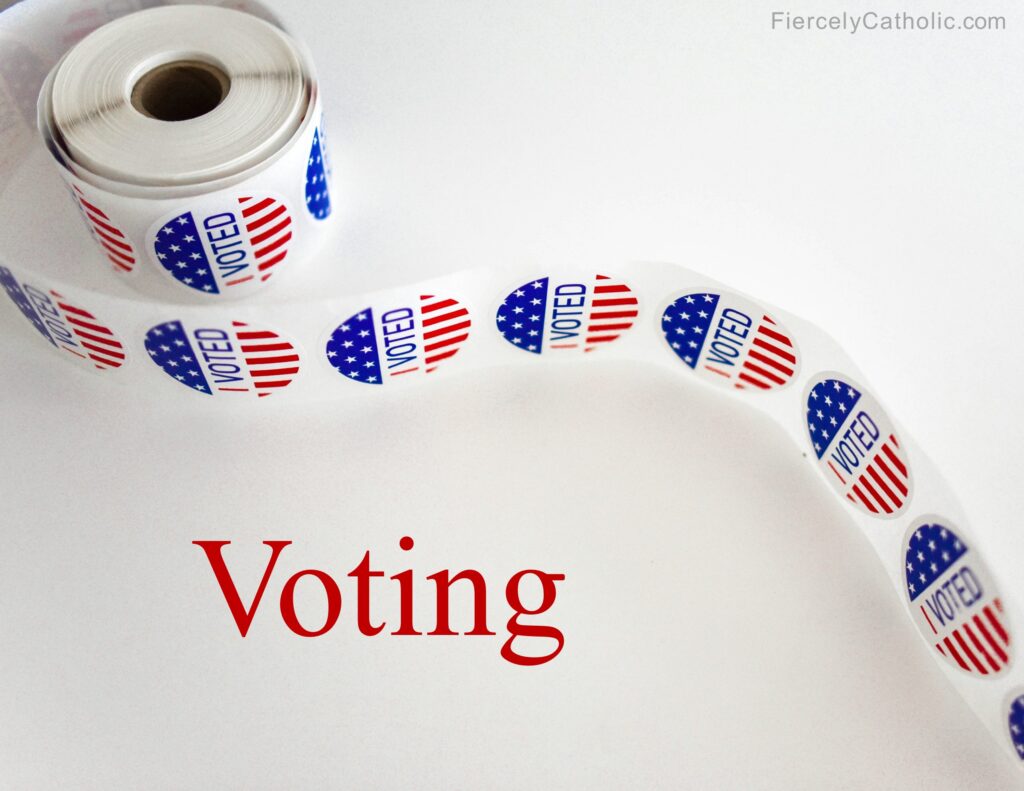
Catholics make up nearly 1/4 of American voters. Every Catholic has a duty to vote based on Catholic moral principles and social teachings that are directed toward achieving the common good, not self-interest.
Being a Catholic in the United States of America means that Catholics vote as faithful citizens, prioritizing the inherent dignity of the human person, respect for life from conception until natural death, and care for the most vulnerable in the world.
Priests and bishops do not tell Catholics who to vote for, but will remind them of their duty to vote. Catholics are also encouraged to vote with well-formed consciences as people of faith and with Christ-centered values.
Sentiments in the nations founding documents, that all men are created equal and are endowed by their Creator with inalienable rights to life, liberty, and the pursuit of happiness, are aligned with the teaching of Jesus.
Catholics form their consciences by studying Sacred Scripture and the teaching of the Catholic Church, by natural reason and examination of facts, and by thoughtful reflection in prayer.
The Catholic Church teaches and promotes values which always stay the same. It does not endorse parties or candidates because they can, and do, change.
Most political platforms fall short of the full Catholic vision of the common good. But, while Catholics should not support a candidate based on a single political issue, certain serious issues can disqualify a candidate from a Catholic’s vote.
American Catholics can find guidance in a document called Forming Consciences for Faithful Citizenship. The document is provided by the United States Conference of Catholic Bishops and is updated for each election.
Catholics are not single-issue voters:
Catholics do not fit into any political box:
First of all, then, I urge that supplications, prayers, intercessions, and thanksgivings be made for all men, for kings and all who are in high positions, that we may lead a quiet and peaceable life, godly and respectful in every way.
1 Timothy 2: 1-2
Catholics should vote with well-formed consciences:
There are three overarching principles for Catholic voters to consider:
Submission to authority and co-responsibility for the common good make it morally obligatory to pay taxes, to exercise the right to vote, and to defend one’s country.
Catechism of the Catholic Church 2240
All moral issues are important but not all issues are morally equivalent:
Moral guidelines for responsible Catholic voting:
The Church, by reason of her role and competence, is not identified in any way with the political community nor bound to any political system. She is at once a sign and a safeguard of the transcendent character of the human person. The Church and the political community in their own fields are autonomous and independent from each other. Yet both, under different titles, are devoted to the personal and social vocation of the same men. The more that both foster sounder cooperation between themselves with due consideration for the circumstances of time and place, the more effective will their service be exercised for the good of all. For man’s horizons are not limited only to the temporal order; while living in the context of human history, he preserves intact his eternal vocation. The Church, for her part, founded on the love of the Redeemer, contributes toward the reign of justice and charity within the borders of a nation and between nations. By preaching the truths of the Gospel, and bringing to bear on all fields of human endeavor the light of her doctrine and of a Christian witness, she respects and fosters the political freedom and responsibility of citizens.
Pope Paul VI, Gaudium et Spes, 7 December 1965
Catholic voting should be rooted in Church teaching:
The Truth, Goodness, and Beauty of the Catholic Church
Jesus is right here:
Share this page with friends and family to start a conversation about your faith.
Don’t miss a post. Learn more about the Catholic Church and strengthen your Catholic faith.
Find more Fiercely Catholic video issues here.
Subscribe here.

